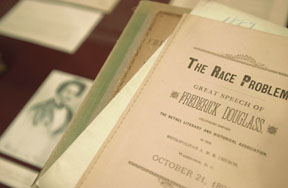![[NEWS AND FACTS BANNER]](/URClipArt/news/titleNewsFactswide.jpg) |
||||||||||||||||

|
||||||||||||||||
|
Coursework
College Launches African-American Studies MajorKiesean Riddick ’03 was in the second semester of his freshman year when he realized he wanted a little more balance in his academic life. So the physics major from Brooklyn signed up for a class on African-American writers offered by the English department. Intrigued at first by the notion of using a less mathematical area of his intellect, Riddick became fascinated with exploring the social, cultural, and historical intersections that help shape the African-American experience in the United States.
Since then, he’s gone on to take enough courses so that when he graduates in May, he’s on track to have the necessary credits to add a second major to his original one. He will become one of the first to graduate from Rochester with a new undergraduate major in African and African-American studies. “This has helped round out my college experience,” Riddick says. “As a physics major, it’s all about the numbers. But as an African-American studies major, I get to focus on culture and history and political science.” Officially approved as an undergraduate degree program during the 2002–03 academic year, the new major is administered by the Frederick Douglass Institute for African and African-American Studies. An interdisciplinary program, the major draws on many of Rochester’s existing courses in literature, history, economics, political science, psychology, anthropology, and other humanities and social science disciplines. The major’s goal is to bring a multidisciplinary perspective to the study of people of African descent in the Atlantic world, including the United States, the Caribbean, and Latin America. “African and African-American studies has reached maturity as a field of study over the past 20 to 30 years,” says Larry Hudson Jr., director of the Douglass Institute and associate professor of history. “With its historic strengths in many of the disciplines that now include a focus on African-American studies, Rochester could be a leader in the field.” To earn a bachelor of arts degree in the new major, students must complete 10 courses, including at least one required history course—either African-American History I or Colonial and Contemporary Africa—an upper-level colloquium, and a senior seminar. This spring, crosslisted courses included Beyond Civil Rights: African American Politics in the International Arena (political science), Slavery and the 20th-Century African-American Novel (English), Evolution of the World Economic Order Since the 16th Century (both economics and history), and Cry Freedom (religion and classics). “The strength, the attractiveness, and the potency comes from the fact that African-American studies is not one single discipline,” Hudson says. “We can identify issues and, within the structure of an interdisciplinary or multidisciplinary approach, say, ‘Here’s the problem. What skills can we bring to better understand it?’” The culmination of a two-year interdisciplinary advisory committee study, the major is expected to attract between five and 10 students a year, and most—like Riddick—are expected to double major. Currently, about 70 faculty members are associated with the Douglass Institute, says John Michael, curriculum director for the institute and a professor of English. Interest in African and African-American studies has grown among faculty as well as students since the field first began to coalesce in the late 1960s and early 1970s, he says. “It’s been one of the great academic success stories of the past 30 years,” Michael says. “There are very few people now in literary studies who could think of themselves as up to date without knowing what’s going on in African-American literature or culture.” Hudson says the new major also reflects the current academic approach of the institute, which has “an undergraduate-inspired outlook that has a broad appeal.” Recent initiatives, which also include a lecture and film series, are designed to expand the opportunities for students to learn about themselves and about their fellow students, he says. “We should offer students an education that is as multifarious as the world in which they will use their education,” he says. It’s a lesson Riddick says he’s learned. “The major has helped me realize that everyone—not just African Americans —has a role in helping all members of all minority communities,” he says. “We’re all in this together.” For more about the Douglass Institute and the new major, visit www.rochester.edu/College/AAS/newaas/undergraduate. |
||||||||||||||||
|
||||||||||||||||
| ©Copyright 1999 — 2004 University of Rochester | ||||||||||||||||
